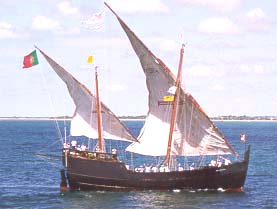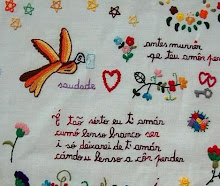quinta-feira, novembro 27
Amália rediscovered
Can´t wait for December 4th (with a little bit luck I might even watch it in Lisbon, surrounded with some friends who are also great fans of Amália! Oxalá!).
The Art of Amalia, Documentary, December 2000
Amália, the movie, December 4th 2008
domingo, maio 25
"Lady of the Sea"
The Field of the Castles
The left elbow is stepped back;
Enigmatic and fateful she stares
The staring face is Portugal.
in "Message"
Lady of the seas
Before you, I'm fallen
Who comes and takes half of life and peace
From this table, from this house, now lost?
Love, what's happened with you?
Lady of the sea
Before you, my soul is empty
Who comes and takes what is mine?
Oh high sea, bring me
My endless love
CHORUS
Ah, black waters, waves of sorrow
They froze the fire in my eyes
He's not sailing anymore
And nobody sees you crying
Lady of the sea

terça-feira, abril 29
"O mare e tu" (The Sea and You)
To overcome the

tiresomeness I listen to music.
Here I leave you with one of the most surprising and
beautiful duets I´ve ever heard: Dulce Pontes and Giorgios Dalaras.
It surely helps you to forget the worries of a long day...hope you like it!
quarta-feira, abril 9
The Aesthetics of Saudade
...........................................
3 - The Aesthetics of Saudade
Sonho doce do mar, ali pousado,
Meditava: aonde vai o sonho humano,
Quando de nós se afasta, já sonhado?
E ficamos mais tristes e sozinhos,
A cada sonho que findou, no mundo.
E, a cada etérea nuvem que se forma,
Torna-se mais salgado o mar profundo.
And Marânus, looking at the bright mist,
Sweet dream of the sea, standing there,
Meditated: whiter goes the human dream,
When smoothed away from us, already dreamed?
And we become sadder and more alone,
Every dream that finishes, in the world.
And, every ethereal cloud that is shaped,
It becomes saltier the deep sea.
(Pascoaes, 1920, p.219)

Melancholy is usually created by the absence of something, may it be a person, a place, one’s health, etc. Marânus, the character symbol of the Saudosismo, from the book Marânus, by Teixeira de Pascoaes, lives indeed in a melancholic condition, and in his case, it happens due to the saudade he feels of Eleonor.
Ítalo Calvino proposes in Six Memos for the Next Millenium a theory that in a diffuse manner literature results from the melancholy (Calvino, 1990, ps. 32 e 64-5). Thus, Leonardo Coimbra is not wrong when he identifies saudade as being the “Portuguese form of creation” (
Que nos prende ao passado.”
“He liked to suffer the ethereal grievance,
That attach us to the past.” (Pascoaes, 1920, p. 193)
4 - Everything is Translatable
»Im Anfang war das Wort!«
Hier stock ich schon! Wer hilft mir weiter fort?
Ich kann das Wort so hoch unmöglich schätzen,
Ich muß es anders übersetzen,
Wenn ich vom Geiste recht erleuchtet bin.
Geschrieben steht: Im Anfang war der Sinn.
Bedenke wohl die erste Zeile,
Daß deine Feder sich nicht übereile!
Ist es der Sinn, der alles wirkt und schafft?
Es sollte stehn: Im Anfang war die Kraft!
Doch, auch indem ich dieses niederschreibe,
Schon warnt
Mir hilft der Geist! Auf einmal seh ich Rat Und schreibe getrost: Im Anfang war die Tat!
It is written:
"In the beginning was the Word!"
Here I’m already stuck! Who’ll help me going further?
I cannot possibly prize the Word so high,
I must translate it otherwise
If I am correctly enlightened by the spirit.
It is written:
“In the beginning was the Meaning”.
Consider well the first line,
So your pen will not be precipitated!
Is the meaning, what produces and creates everything?
It should be:
In the beginning was the Force!
Yet, even while I write this down
Something warns me already, that I won’t stick with it.
The spirit helps me! Finally I find advice
And confident I write:
In the beginning was the Action.
The chief concerning while translating shouldn’t be fidelity merely to the word. The word is produced based on a Meaning, a Force, an Action or whatever, no doubt, comes first. Naturally these concepts may seem too blurred, but it’s perfectly possible to understand their relevance. Thus, it is necessary to mainly concern about what significance was given to a word based on, according to Faust’s four attempts, what was there in the beginning. One must consider a word’s meaning and background, then find the equivalent word based not simply on it, but on its significance. There may exist indeed words without equivalents in other languages; what is always translatable is the significance of the words, which can always be explained and incorporated. The difficulty is usually to understand the proper significance of each word, and not so much in finding equivalents.
Saudade is, therefore, one of the deepest human feelings, and the greatness of its power is exactly that it transcends itself, creating other feelings, which, by their turn, stimulate men. And that’s certainly one of the difficulties of translating or even grasping the philosophical significance of saudade: saudade becomes greater and deeper while illuminating other feelings, but it also becomes more difficult to understand it. If this is not enough, we can quote Marânus for a last time:
A trágica matéria que a produz.
Na grande escuridão, sou facho a arder
E não avisto minha própria luz!
I am not happiness, but only
The tragic substance that produces it.
In the great darkness, I am a burning flambeau
And I don’t see my own light.
(Pascoaes, 1920, p.216)
domingo, abril 6
A book about Fado
Fado Portugues: Songs from the soul of
Compiled and edited by Donald Cohen
with Music arranged for voice and guitar.
Includes CD with 26 classic recordings.
Donald Cohen, a retired Los Angeles attorney and fado expert, says that although fado in its current form is about 200 years old, its roots go back to the 12th century to traditions of song and poetry brought by Provencal troubadours, the Moors who lived in Portugal, and the Jews.
“Like other things in Portuguese culture, it has been untouched. Everybody knows flamenco, about tango, about bossa nova. But when you say, ‘What about fado?’ they say, ‘Huh?’ While I want to see that change, it also makes it an undiscovered musical treasure.”
Excerpted from the
The Sweet Sigh of Sadness,
May 7, 2003
Buy it here! ;)
quarta-feira, março 26
Easter Traditions: a scent of Minho!

and the sweets, "pastry temptations" where the "yellow" is the king! (my cholesterol! ouch! :P)

 We also eat lots of chocolates, mostly chocolate eggs and the chocolate almonds with different colours and flavours. My favourites are those powdered with icing sugar and cinnamon: we call them "Ceilão"(Ceylon) almonds, which is the former name for Sri Lanka (you can guess why we call them Ceilão...)
We also eat lots of chocolates, mostly chocolate eggs and the chocolate almonds with different colours and flavours. My favourites are those powdered with icing sugar and cinnamon: we call them "Ceilão"(Ceylon) almonds, which is the former name for Sri Lanka (you can guess why we call them Ceilão...)And of course, last but not the least, as Christians we "open the door" to the priest who starts by saying "Jesus Christ resurrected!Alleluia! Alleluia!" and sprinkles holly water at the people (sometimes you really take a bath! :P) and then gives us the crucified Christ so that we can kiss His feet or His face (you choose! :P).

Of course you pay for this short "visit": we gave the priest a sealed envelope with our family name written outside and with 60 euros inside, because the Church would never EVER do anything for his followers without charging them ("you give what you want, but usually people give us not less than 20 euros"---HYPOCRITES! ( my critics to the Catholic Church are endless...I´ll leave them for some other time and space...the only good thing about the Church is that she preaches God´s word, His teachings and keeps the memory of Christ alive. The Institution itself is...I don´t even know what to call it!)
segunda-feira, março 17
Wonders of Portugal: monuments, places, music, poetry, unique cultural heritage! The Past and Future of bright Nation...
THE PRINCE (O INFANTE)
God willed that all the earth be one,
That seas unite and never separate.
You He blessed, and you went forth to read the foam.
And the white shore lit up, isle to continent,
And flowed, even to the world's end,
and suddenly the earth was seen complete,
Upsurging, round, from blue profundity.
Who blessed you made you Portuguese.
Us He gave a sign: the sea's and our part in you.
The Sea fulfilled, the Empire fell apart.
Lord,
Fernando Pessoa,
"Mensagem"
This book, "Message", is the most mystical of all Pessoa´s work. Here he reinforces the everlasting theory of the 5th Empire. I won´t tell much more about this, by now; It is a fascinating theory about which I´ll write soon. For now get the idea that
Detail of the nose of NRP Sagres sail training ship, where you can see a representation of Infante D. Henrique to whom the poem is dedicated.
segunda-feira, fevereiro 18
Carlos do Carmo wins Goya Award
Monk Rider: the journey through the Self
"From the valley to the mountain, From the mountain to the hill, Horse of shadow, monk rider. Through houses, through meadows, Through gardens, through fountains, In alliance you walk. From the valley to the mountain, From the mountain to the hill, Horse of shadow, monk rider. Through black cliffs, Behind and ahead, In secrecy you walk. From the valley to the mountain, From the mountain to the hill, Horse of shadow, monk rider. Through desert meadows, Without horizons, In freedom you walk.
From the valley to the mountain, From the mountain to the hill, Horse of shadow, monk rider. Through trackless ways, Through rivers without bridges, In solitude you walk. From the valley to the mountain, From the mountain to the hill, Horse of shadow, monk rider. For it is endless And accounted by no one, In me you walk. Through black cliffs, Through rivers without bridges, In me you walk."
This is the journey of self discovery. “Know yourself, defy your limits” was Socrates motto meaning with this that if you want to value the light, the perfection you first have to go deeper, and experience the darkness.
For this video, Mariza (of course, who else?) chose for scenario the “Quinta da Regaleira” in Sintra* one of the most mystical places of
*The name “Sintra” has its origin in the word “Cynthia“, symbol of the moon in the celtic mythology. The Romans called it “Mons Lunae“, meaning “the hill of the moon“, and there were deeds sacrifices in its honour. This mystical stigma has been maintained until our times.
Sintra is a romantic getaway for people from all around the world, and has always been a place of election by kings and nobles as a country resort, and praised by writers and poets.
quarta-feira, janeiro 23
Teixeira de Pascoaes: the poet (philosopher?) of Saudosism
So, who was Teixeira de Pascoaes ?



















